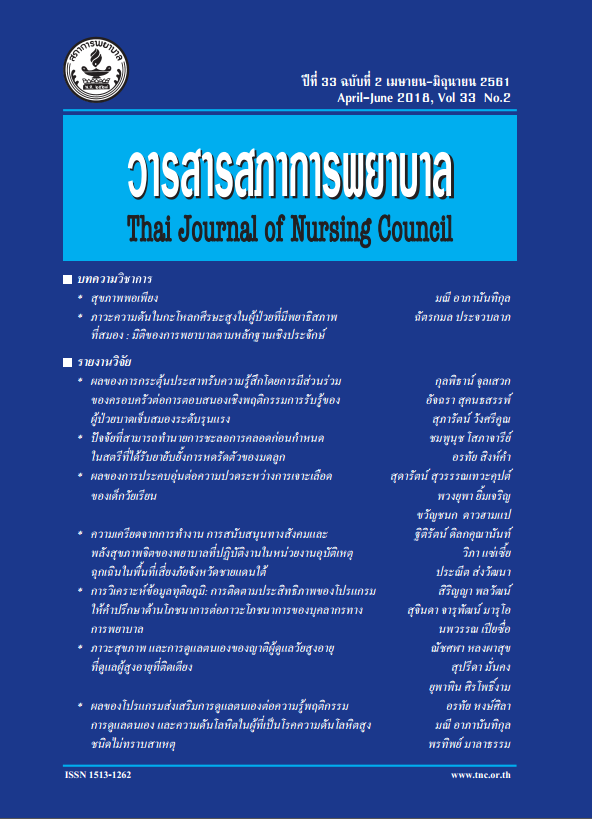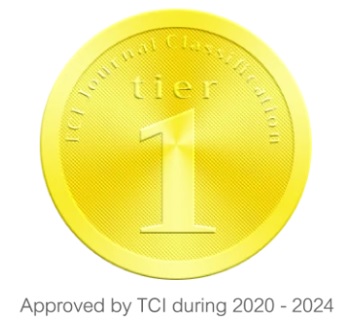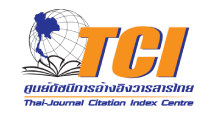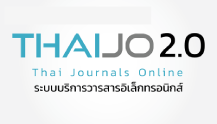Effects of a Self-Care Promoting Programme on Knowledge, Self-Care Behaviours, and Blood Pressure in Persons with Essential Hypertension
Keywords:
self-care promoting programme, persons with essential hypertension, knowledge, self-care behaviors, blood pressureAbstract
Abstract
Objective: To examine the effectiveness of a self-care promoting programme on the
knowledge, self-care behaviours, and blood pressure in persons with essential hypertension.
Design: Two-group quasi-experimental research with a pre-test and a post-test.
Procedure: This study was conducted on a purposive sample of 64 patients treated
at the hypertension clinics of a hospital network in Srisaket province. Thirty-one of the patients
were assigned to an experimental group and the others to a control group. The experimental
group participated in a 10-week self-care promoting programme, which consisted of group
activities and telephone-mediated motivation in addition to standard care, whereas the control
group was given only standard care. Data were collected by means of (i) a general information
questionnaire; (ii) a knowledge of self-care need questionnaire; and (iii) a self-care assessment
form for elderly people with hypertension, along with blood pressure measuring. The data
were analysed using a paired t-test, independent t-test, and repeated measures ANOVA.
Results: The 64 subjects, whose ages ranged between 45 and 60 years, consisted
of 46 females and 18 males. After completing the programme, (1) the experimental group’s
average scores on knowledge and self-care behaviours were signifcantly higher than before
programme participation and than those of the control group; (2) the experimental group’s
average systolic and diastolic blood pressure levels were signifcantly lower than those
of the control group; and (3) the programme and its duration jointly influenced the experimental
group’s systolic and diastolic blood pressure levels, which decreased signifcantly between
week 1 and weeks 4, 8, and 12, with no signifcant difference detected in weeks 8 and 12.
Recommendations: The fndings could provide baseline data for nurses to devise
a plan to promote self-care activities for people with hypertension. This programme can
be used to raise an awareness of the signifcance of self-care and to encourage people with
hypertension to participate in self-care activities, to the extent that their self-care behaviours
becomes consistent and adequate, which could control their blood pressure to a normal level.
References
2. Thai hypertension society. Thai guidelines on the treatment of hypertension 2012 update 2015. Bangkok: Hua Nam Printing; 2015. (In Thai)
3. World Health Organization Regional Offce for South-East Asia. Hypertension fact sheet [internet]. 2011 [cited 2014 Sep 19]. Available from: https://www.searo.who.int/entity/noncommunicable_diseases/media/non_communicable_diseases_hypertension_fs.pdf
4. Aekplakorn W, editor. Thai national health examination survey, NHES V, 2014. Nonthaburi: Health Systems Research Institute; 2016. (In Thai)
5. MacGregor GA, Kaplan NM. Fact facts: Hypertension. 4 th ed. Oxford: Health Press; 2010.
6. Mancia G, De Backer G, Dominiczak A, Cifkova R., Fagard R, Germano G. 2007 Guidelines for the management of arterial hypertension: The task force for the management of arterial hypertension of European Society of Hypertension (ESH) and of the European Society of Cardiology (ESC). J Hypertens. 2007; 25(6): 1105-87.
7. Bureau of Non Communicable Diseases. The number of deaths and the mortality rate caused by hypertension
(I10-I15) per 100,000 population 2007-2015 classifed by Province, Health Service Area, and Overall of Country (including Bangkok) [internet]. 2016 [cited 2017 Nov 20]. Available from: https://www.thaincd.com/s/dl 11126/document/file/info/non-communicable-disease. (In Thai)
8. Bureau of Non Communicable Diseases. A campaign theme for World Hypertension Day 2015 [internet]. 2015 [cited 2017 Nov 20]. Available from: odpc9. ddc.moph.go.th/PR/58- Hypertension.pdf (In Thai)
9. Newman S, Steed L, Mulligan K. Chronic physical illness: Self-management and behavioural intervention. New York: Mcgraw-Hill; 2009.
10. Group of Disease Control, Sisaket Provincial Public Health Offce. The report of the number of patients (new case) with diabetes mellitus, hypertension, ischemic heart disease, cerebro vascular disease, and chronic pulmonary disease [internet]. 2017 [cited 2017 Mar 1]. Available from: https://203.157.165.114/chronic/ rep_serv_newpt.php (In Thai)
11. Nongmuang S. Development of service system for self care promotion in the patients with hypertention at Suengkhao subdistrict health promoting hospital, Srirattana District, Sisaket Province [Master’s thesis]. Mahasarakham: Mahasarakham University; 2012.(In Thai)
12. Kaewpuang A. Health behaviors of patients with uncontrolled hypertension at Srangpee subdistrict health promoting hospital, Rasi Salai District, Sisaket Province [Bachelor’s independent study]. Mahasarakham: Mahasarakham University; 2011. (In Thai)
13. Rattanawan W. A self-care promotion model for controlling blood pressure in hypertension. NorthEastern Primary Health Care Journal. 2008; 22(6):239-47. (In Thai)
14. Boonkokaew K. The effects of an application of quality cycle with participation and social support on changing behaviors of hypertension patients in Phayu District, Sisaket Province [Master’s thesis]. Mahasarakham: Mahasarakham University; 2010. (In Thai)
15. Waraput N. The effects of appication of health belief model and social support on reduction of the complications among essential hypertension patients at Uthumphon Phisai District, Sisaket Province [Master’s thesis]. Mahasarakham: Mahasarakham University; 2011. (In Thai)
16. Rujiwatthanakorn D, Panpakdee O, Malathum P, Tanomsup S. Effectiveness of a self-management program for Thais with essential hypertension. Pacifc Rim Int J Nurs Res. 2011; 15(2): 97-110.130
17. Hanuchareonkul S, editor. Self-Care: The Art and Science of Nursing Care. 6th ed. Bangkok: V.J. Printing; 2001. (In Thai).
18. Saiful BA. Dr Saiful’s notes on Medical Education [internet]. 2011 [cited 2015 Jan 6]. Available from: https://saifulbahri.com/Medical_education/Medical_Education_Notes_ Sem_2/SAMPLE_ SIZE.pdf
19. Krirkgulthorn T. Effects of self-care promotion program on knowledge, self-care practices and blood pressure
in hypertensive elderly women [PhD thesis]. Bangkok:Faculty of Graduate Studies, Mahidol University; 2001.(In Thai)
20. Bilal M, Haseeb A, Lashkerwala SS, Zahid I, Siddiq K, Saad M, et al. Knowledge, awareness and self-care practices of hypertension among cardiac hypertensive patients. Glob J Health Sci. 2016; 8(2): 9-19.
21. Houngsuksakul N. Self-care behaviors of hypertension patients in Community Hospital Ubon Ratchathani Province [Master’s thesis]. Ubon Ratchathani: Graduate School, Ubon Ratchathani Rajabhat University; 2012.(In Thai)
22. Rodkhum W. Self-esteem affecting self care to prevent complications of patients with essential hypertension
Inburi District, Sing Buri Province [Master’s thesis]. Chonburi: Burapha University; 2014. (In Thai)
23. Hirungerd S, Hornboonherm P, Sitipakorn S. The effects of behavioral modifcation program on knowledge,self–care behavior and blood pressure level in prehypertension group, Kaengkhro Hospital Chaiyaphum Province. Journal of Nurses’ Association of Thailand, North-Eastern Division. 2013; 31(4): 97-104.(In Thai)
24. Thongdang K, Promsiripaiboon Y. Effect of group process to change health behaviour of patients with hypertension at Watpradoo health promotion hospital,Muang District, Surat Thani Province. Community Health Development Quarterly Khon Kaen University. 2015; 3(2): 261-71. (In Thai)
25. Kallaka S, Chantra R, Sarakshetrin A, Thanaroj S, Saojawutipong W. The effects of using a video shadow puppet troupe and self-care manual on knowledge and self-care behavior of persons with type 2 diabetes mellitus. Nursing Journal of the Ministry of Public Health. 2017; 27(1): 146-56. (In Thai)
26. Wongngam W, Sucamvang K, Nanasilp P. Effect of Educative-Supportive Nursing on self-care behaviors of the elderly with hip fracture during recovery stage. Nursing Journal of the Ministry of Public Health. 2014 ;41(2): 72-82. (In Thai)
27. Souza FRD, Santana CS. A descriptive study about the use of pillboxes by older adults. Health. 2013;5: 103-9.
28. Sa-ard S. Development of health education model using by self directed learning media for chronic patients. Academic Services Journal Prince of Songkla University. 2015; 26(2): 41-9. (In Thai)
29. Varitsakul R. The effectiveness of self-care participation promotion program on perceived self-care effcacy, disease control, and satisfaction of health care service in essential hypertensive patients [Master’s thesis]. Bangkok: Faculty of Graduate Studies, Mahidol University; 2001. (In Thai)






